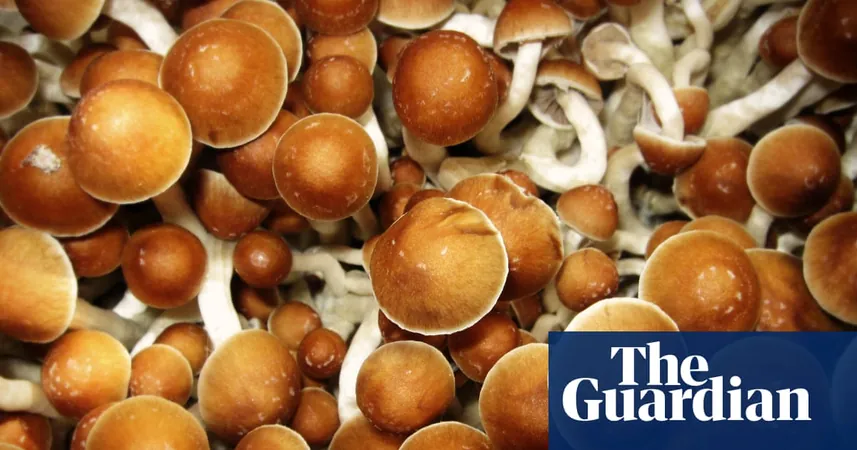
The Dark Side of the Psychedelic Renaissance: Experts Warn of Mental Health Dangers Linked to Growing Magic Mushroom Use
2024-12-25
Author: Amelia
The Rise of Magic Mushroom Use
Magic mushrooms, celebrated for their psychedelic properties, are experiencing a surge in popularity, leading to what many are dubbing a “psychedelic renaissance.” With increasing interest in their potential mental health benefits, this trend has been accompanied by alarming warnings from mental health experts about the risks associated with recreational use of psilocybin, the active compound in these mushrooms.
Growing Popularity and Legal Status
Recent studies and trials have shown psilocybin's potential as a revolutionary treatment for various mental health disorders such as depression and PTSD, prompting a wave of new companies and retreats offering psychedelic experiences. In countries where psilocybin is legal, these therapies are paving the way for a new frontier in mental health treatment. However, in the UK, where psilocybin remains classified as a Class A drug, illicit use is on the rise. The latest statistics from the Office for National Statistics indicate that between 2023 and 2024, the use of magic mushrooms grew by a staggering 37.5%, reaching about 1.1% of adults aged 16 to 59—approximately 300,000 individuals—making it nearly as prevalent as ecstasy.
Risks of Unsanctioned Use
Despite the positive results seen in clinical settings, experts caution that unsupervised use of psychedelics can lead to harmful psychological effects, including anxiety, trauma, insomnia, and a condition known as Hallucinogen Persisting Perception Disorder (HPPD), where users experience lingering visual distortions. Jules Evans, director of the Challenging Psychedelic Experience project, highlights a troubling trend: individuals suffering from adverse effects often lack the awareness of the potential long-lasting damage that uncontrolled psychedelic experiences can inflict.
Misdiagnosis and Lack of Expertise
During interviews for his research, Evans encountered individuals traumatized by challenging psychedelic experiences who were later misdiagnosed with psychosis by untrained mental health professionals. This mismanagement highlights a major gap in expertise among mainstream healthcare providers when dealing with complications arising from psychedelic use.
Influence of Integration Coaches
Furthermore, the psychological distress can be exacerbated by integration coaches who advocate a dogmatic view of psychedelics as benevolent forces providing wisdom, potentially leading users to misconstrue dangerous experiences as enlightening. “Many individuals are left feeling worse off after seeking help from those who uphold such beliefs,” Evans remarked.
Long-term Impairments and Historical Incidents
Research suggests that close to 9% of individuals who use psychedelics report long-term impairments stemming from their use, often affecting their daily lives. Ed Prideaux, a researcher who has personally experienced the effects of HPPD, reports lingering visual disturbances that he claims are common among the psychedelic community. His cautionary stance is compounded by historical incidents, such as that of U.S. pilot Joseph Everson, who crashed his plane after using magic mushrooms, raising further concerns about the unpredictability of these substances.
Emergence of Specialist Clinics
Recognizing the growing need for specialist care, several clinics in Europe, such as the Ambulanz psychedelische Substanzen in Berlin, have emerged to provide services tailored to psychedelic-related complications. Founded by psychiatrist Tomislav Majić, this clinic addresses the need for psychological support among individuals who often turn to psychedelics for self-medication, sometimes under the guidance of untrained facilitators.
The Psychedelic Experience Clinic in the UK
In the UK, the Psychedelic Experience Clinic—launched by Timmy Davis—is the first of its kind to cater specifically to individuals experiencing issues related to recreational psychedelic use. Davis emphasizes the importance of creating a supportive environment that is free from stigma, as many individuals have unrealistic expectations about the therapeutic benefits of psychedelics cultivated from popular literature and media portrayal.
Need for Better Education
Experts like David Erritzoe from Imperial College London stress that psychedelics, while often safe physically with minor side effects, can evoke intense psychological reactions that might unveil deep-seated trauma. This has led to a call for better education and support mechanisms for recreational users, as many exhibit a lack of understanding about the intricacies of their mental health.
Conclusion: Navigating the Psychedelic Landscape
In conclusion, while the allure of magic mushrooms grows amidst a backdrop of potential benefits, it is imperative to recognize the psychological risks involved. With increasing reports of painful experiences and negative effects, it is crucial for both users and healthcare providers to stay informed and vigilant in navigating this complex landscape. Without proper guidance and understanding, the promise of psychedelics may lead to unintended and detrimental consequences. As this field continues to evolve, prospective users should be aware: the path to mental health through psychedelics can be fraught with peril.









 Brasil (PT)
Brasil (PT)
 Canada (EN)
Canada (EN)
 Chile (ES)
Chile (ES)
 España (ES)
España (ES)
 France (FR)
France (FR)
 Hong Kong (EN)
Hong Kong (EN)
 Italia (IT)
Italia (IT)
 日本 (JA)
日本 (JA)
 Magyarország (HU)
Magyarország (HU)
 Norge (NO)
Norge (NO)
 Polska (PL)
Polska (PL)
 Schweiz (DE)
Schweiz (DE)
 Singapore (EN)
Singapore (EN)
 Sverige (SV)
Sverige (SV)
 Suomi (FI)
Suomi (FI)
 Türkiye (TR)
Türkiye (TR)